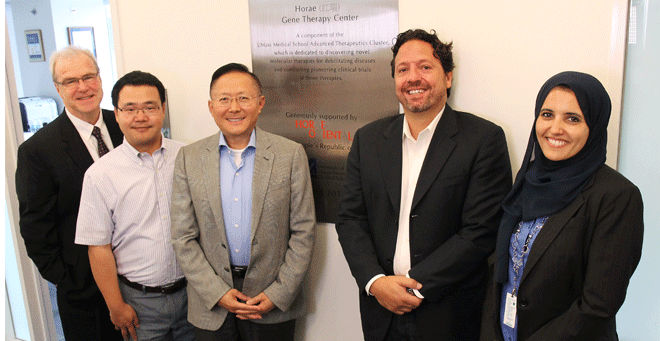 |
|
|
Members of the program project grant team, left to right, include Terence R. Flotte, MD; Wen Xue, PhD; Guangping Gao, PhD; Christian Mueller, PhD; and Mai ElMallah, MD. |
An innovative program project grant that will fund new approaches to gene therapy for alpha-1 antitrypsin deficiency has been awarded to a multidisciplinary team of researchers and clinicians at UMass Medical School by the National Heart, Lung and Blood Institute. The grant, totaling more than $11 million over five years, will be used to investigate three different genetically based approaches to treat the disease.
“This is a translational program project grant, of which fully 25 percent of the work will involve clinical objectives,” said Terence R. Flotte, MD, the Celia and Isaac Haidak Professor of Medical Education, executive deputy chancellor, provost, dean of the School of Medicine and professor of pediatrics and microbiology & physiological systems and the principal investigator on the grant. “It’s especially interesting because it includes development of three different modalities to treat disease: gene therapy, gene editing and microRNA.”
Alpha-1 antitrypsin deficiency, or “alpha-1,” is a single gene disorder leading to emphysema and other forms of chronic obstructive pulmonary disease, a debilitating and potentially deadly condition that can take a long time to diagnose. Progress in diagnosis and treatment has added years to many patients’ lives; new approaches using gene therapy and gene editing form the basis for this grant.
Alpha-1 antitrypsin deficiency affects at least 100,000 people in the United States. However, an estimated 20 million people carry the gene for the disease and could pass it to their children. That’s as many as carry mutations for cystic fibrosis, which is much more widely recognized.
The alpha-1 antitrypsin protein protects healthy lung tissue from being degraded by certain enzymes. The key symptoms of alpha-1 antitrypsin deficiency are progressive shortness of breath and liver failure. For many years, most patients in the United States have been treated with augmentation therapy, which comprises regular infusions of replacement alpha-1 protein.
“This is a disease that appears treatable by gene therapy, and possibly other breakthrough methods as well,” said Dr. Flotte.
The grant builds on more than 15 years of continuous NHLBI funding to the Flotte lab for recombinant adeno-associated virus-based (rAAV) gene therapy research aimed at treating alpha-1. Significantly, phase 2a clinical trials demonstrated persistence of gene therapy effects, indicating a unique mechanism that allows rAAV vectors to persist even in the face of an ongoing immune response.
Building on this earlier work, several new approaches to rAAV-based gene therapy will move toward clinical translation in four discrete subprojects that take advantage of new discoveries in vector development, miRNA biology and gene editing at UMMS. The four discrete subprojects will focus on:
- New, second-generation rAAV vectors directed to muscle tissue;
- ‘Liver-sparing’ vectors designed to treat lung disease without exacerbating the liver disease associated with alpha-1, using microRNA;
- RNA-guided genome editing with the CRISPR/Cas9 system–a potentially revolutionary technology for treating genetic disease. The gene editing project will also develop an animal model of alpha-1, ideal for testing the correction of clinically relevant symptoms and for creating the actual genomic target sequence for genome editing; and
- Next-generation AAV vector development.
“It’s important to note that this program project integrates work in the RNA Therapeutics Institute and the Gene Therapy Center, an important partnership,” said Flotte. “In addition, the funding provides important support for research cores at UMMS, which we will use to generate both animal models and the delivery vectors necessary for the work.”
Working with Flotte on the project are Guangping Gao, PhD, professor of microbiology & physiological systems and director of the Horae Gene Therapy Center and Vector Core; Mai ElMallah, MD, assistant professor of pediatrics; Christian Mueller, PhD, associate professor of pediatrics; and Wen Xue, PhD, assistant professor in the RNA Therapeutics Institute.